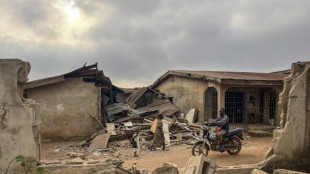With eye on oil wealth Suriname parties enter coalition talks
The two main political parties in Suriname, a tiny South American country that has recently discovered major oil deposits, were neck-and-neck Sunday in parliamentary elections that will decide how the country's newfound riches are spent.
The tiny former Dutch colony of 600,000 inhabitants, one of the poorest countries in South America, is hoping that oil will bring prosperity, without compromising its climate fight.
French group TotalEnergies has announced a $10.5 billion investment to exploit an offshore field with an estimated capacity of 220,000 barrels per day.
The oil manna dominated campaigning in the election for parliament, which will in turn choose a president and vice president.
With 90 percent of the votes counted on Sunday evening, incumbent President Chan Santokhi's centrist VHP party and his rival Jennifer Simons' leftist National Democratic Party were forecast to win between 17 and 18 seats each.
With neither in a position to win a majority, the two parties were expected to begin talks with smaller parties on trying to form a government.
Speaking to AFP ahead of the election, Santokhi said the "huge amount of income" expected from fossil fuels meant he could "do more for our people so that everyone can be part of the growth of the nation."
A former policeman and justice minister, he asked his fellow citizens on Sunday to give him "the mandate to finish our task."
Simons, who chairs the National Assembly, told AFP that if elected she would work "to ensure that the population truly benefits" from the influx of oil revenues by "establishing a law requiring all enterprises to work with Surinamese and buy Suriname products."
Several voters expressed hopes of a better future.
"I hope that it (oil) will change our country... so we can live a little bit better," said 29-year-old Laloo Raghnie, citing the need for "better roads, some more security in our lives, more education for our children and better workplaces for people who are already studying."
- Royalties for everyone -
Whoever does take the reins will have a rare opportunity to transform the country's fortunes.
The country has created a "Royalties for Everyone" fund to put money from the expected oil windfall directly into the hands of citizens once production starts in 2028.
Fourteen parties took part in Sunday's election.
Suriname, a diverse country made up of descendants of people from India, Indonesia, China, the Netherlands, Indigenous groups and African slaves, marks its 50th anniversary of independence from the Dutch throne this November.
In recent years, it has looked increasingly toward China as a political ally and trading partner and, in 2019, became one of the first Latin American countries to join the Asian giant's Belt and Road infrastructure drive.
US Secretary of State Marco Rubio made a stopover in Suriname in March on a Latin American tour aimed at countering China's growing regional influence.
W.Axelsson--StDgbl





